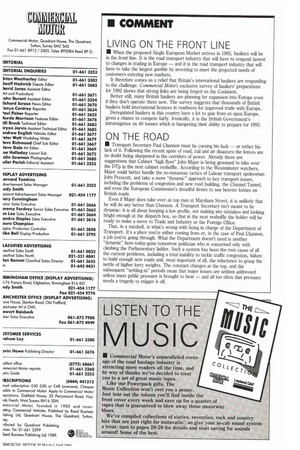LIVING ON THE FRONT LINE
Page 5

If you've noticed an error in this article please click here to report it so we can fix it.
• When the proposed Single European Market arrives in 1992, hauliers will be in the front line. It is the road transport industry that will have to respond fastest to changes in trading in Europe — and it is the road transport industry that will have to take the largest gamble by investing to meet the projected needs of customers entering new markets.
It therefore comes as a relief that Britain's international hauliers are responding to the challenge. Commercial Motor's exclusive survey of hauliers' preparations for 1992 shows that strong links are being forged on the Continent.
Better still, many British hauliers are planning for expansion into Europe even if they don't operate there now. The survey suggests that thousands of British hauliers hold international licences in readiness for improved trade with Europe.
Deregulated hauliers in this country have a lot to gain from an open Europe, given a chance to compete fairly. Ironically, it is the British Government's intransigence on 40 tonnes which is hampering their ability to prepare for 1992.
ON THE ROAD
• Transport Secretary Paul Channon must be cursing his luck — or rather his lack of it. Following the recent spate of road, rail and air disasters the knives are no doubt being sharpened in the corridors of power. Already there are suggestions that Cabinet "high flyer" John Major is being groomed to take over the DTp in the next cabinet reshuffle. According to the Westminster watchers, Major could better handle the no-nonsense tactics of Labour transport spokesman John Prescott, and take a more "dynamic" approach to key transport issues, including the problems of congestion and new road building, the Channel Tunnel, and even the European Commission's dreadful desire to see heavier lorries on British roads.
Even if Major does take over as top man at Marsharn Street, it is unlikely that he will do any better than Channon. A Transport Secretary isn't meant to be dynamic: it is all about keeping a low profile, not making any mistakes and looking bright enough at the dispatch box, so that in the next reshuffle the holder will be ready to make a move to Trade and Industry or the Foreign Office.
That, in a nutshell, is what's wrong with being in charge of the Department of Transport. It's a place you're either coming from or, in the case of Paul Channon, a job you're going through. What the Department doesn't need is another "dynamic" here-today-gone-tomorrow politician who is concerned only with climbing the Parliamentary ladder. Such a system has been the root cause of all the current problems, including a total inability to tackle traffic congestion, failure to build enough new roads and, most important of all, the reluctance to grasp the nettle of higher lorry weights. The constant changes at the top, and the subsequent "settling-in" periods mean that major issues are seldom addressed unless mass public pressure is brought to bear — and all too often that pressure needs a tragedy to trigger it off.








































































































































